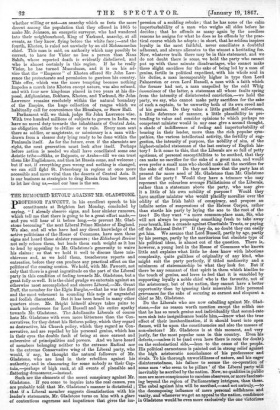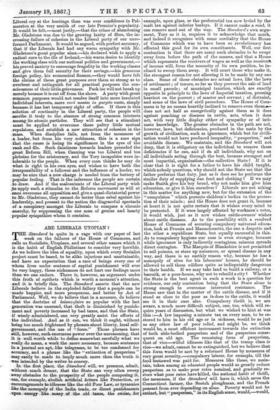THE RUMOURtp REVOLT AGAINST AIR GLADSTONE.
PROFESSOR FAWCETT, in his excellent speech to his constituents at Brighton last Monday, concluded by saying, "I already observe signs, and hear sinister rumours, which tell me that there is going to be a great effort made,— and you will hear of it before long,—to prevent Mr. Glad- stone becoming" the next Liberal Prime Minister of England. We also, and all who have had any direct knowledge of the active politicians of the House of Commons, have seen these signs and heard these sinister rumours ; the Edinburgh Review not only echoes them, but lends them such weight as it has to lend by appealing to Mr. Gladstone's generosity to waive his claims ; so that we hold it well to discuss these mis- chievous and, as we hold them, treacherous reports and entreaties, before they can produce any practical effect on the politics of the coming session. We hold, with Mr. Fawcett, not only that there is a great ingratitude on the part of the Liberal party in this condition of feeling towards Mr. Gladstone, but a great folly as well. It is the chief grudge we entertain against an otherwise most accomplished and sincere Liberal,—Mr. Grant Duff, the member for the Elgin Burghs,—that he was the first and the most vehement in sounding this note of ungrateful and foolish discontent. But it has been heard in many other quarters since. Mr. Bright hiinself always takes pains to mark his preference for Lord Russell and his entire apathy towards Mr. Gladstone. The Adullamite Liberals of course hate Mr. Gladstone with even more bitterness than the Con- servatives, for they detest his Reform policy, which they regard as destructive, his Church policy, which they regard as Con- servative, and are repelled by his personal genius, which has in their eyes the double fault of being at once earnest and subversive of principalities and powers. And we have heard of members belonging neither to the extreme Radical nor to the extreme Conservative wing of the Liberal party, who would, if any, be thought the natural followers of Mr. Gladstone, who are loud in their rebellion against his authority, and in clamouring for some nobody as their Cap- tain,—perhaps of high rank, at all events of plausible and flattering demeanour,—instead.
Such are the elements of the secret conspiracy against Mr. Gladstone. If you come to inquire into the real causes, you are probably told that Mr. Gladstone's manner is dictatorial ; that if a Liberal member suggests dissatisfaction with his leader's statements, Mr. Gladstone turns on him with a glare of contentious eagerness and impatience that gives the im- pression of a scolding rebuke ; that he has none of the calm imperturbability of a man who weighs all sides before he ; that he offends as many again by the needless reasons he assigns for what he does as he offends by the prac-
tical course which he adopts ; in short, that he seldom inspires loyalty in the most faithful, never conciliates a doubtful adherent, and always alienates to the utmost a hesitating foe. Now, whatever truth there may be in this statement, and we do not doubt there is some, we hold the party who cannot put up with these minute disadvantages, who cannot make these slight sacrifices for the sake of being led by a man of genius, fertile in political expedient, with his whole soul in his duties, a man incomparably higher in type than Lord Palmerston or even Lord Russell, a man with a faith which the former had not, a man unspoiled by the cold Whig insouciance of the latter, a statesman all whose faults spring from the intensity of disinterested conviction,—we hold the party, we say, who cannot make petty sacrifices for the sake of such a captain, to be unworthy both of its own creed and of his genius. Do they value a little gratified self-esteem, a little deference of manner, a little plausibility in pre- tending to value and consider opinions to which perhaps no competent minister would in any case give a second thought, a shade of indifference of feeling and imperturbability of bearing in their leader, more than the rich popular sym- pathies, the various intellectual activity, the fertility of sug- gestion, the intensity of purpose, the nobility of aim, of the highest-minded statesman of the last century of English his- tory ? Is it come to this, that the Liberals are so full of petty egotisms, of personal susceptibilities to be soothed, that they can make no sacrifice for the sake of a great man, and would even prefer a small man who should make all the sacrifices for the sake of them ? Do they not know that the party has at present far more need of Mr. Gladstone than Mr. Gladstone has of the party ? Would they have a trimmer who may represent the colourless average Philistinism of the Liberals, rather than a statesman above the party, who may give it a little of his own nobility of purpose ? Would they have another minister who would placidly moralize over the oddity of the Irish habit of conspiracy, and propose an infinite series of suspensions of the Habeas Corpus, rather than startle his party by laying the axe to the root of the tree ? Do they want "a more common-place man, Sir, who will not always be proposing something fresh to take away your breath, like a crusade against Charitable Trusts, or paying off the National Debt ?" If they do, no doubt they can easily get him. We assume that Lord Russell, partly by age, partly by his peerage, partly by the meritorious but obsolete type of his political ideas, is almost out of the question. There however, a young lord in the House of Commons who knows little and explains what little he does know with laborious complexity, quite guiltless of originality of any kind, who might suit the party perfectly, if titled mediocrity and a minimum of statesmanship be what they look for. But if there be any remnant of that spirit in them which kindles to the touch of genius, and loves to feel that it is ennobled by supporting loyally a noble chief who is the favourite, not of the aristocracy, but of the nation, they cannot have a better opportunity than by ignoring their miserable little personal grievances for the sake of securing so earnest and eloquent a chief as Mr. Gladstone.
Do the Liberals who are now caballing against Mr. Glad- stone,—for no reason worth mention except the selfish one that he has so much genius and individuality that second-rate men sink into insignificance beside him,—know what the true effect of their insubordination, if it should burst into open flames, will be upon the constituencies and also the masses of non-electors? Mr. Gladstone is at this moment, and very justly, far the most popular man in this country. Even his defects,—unless it be (and even here there is room for doubt)- on the ecclesiastical side,—lean to the cause of the people.. His political earnestness is painted out in strong relief against the high aristocratic nonchalance of his predecessor and. rivals. To his thorough unworldliness of nature, and his eager disinterestedness, his failure to secure the co-operation of • some men who seem to be pillars' of the Liberal party will inevitably be ascribed by the nation. Now, no qualities in public- men are more conspicuous to careless observers, or more fascinat- ing beyond the region of Parliamentary intrigues, than these. The cabal against him will be ascribed,—and not untruly,—to the decomposing influence of mere personal selfishness and vanity, and whenever we get an appeal to the nation, confidence in Gladstone would be even more exclusively the one victorious Liberal cry at the hustings than was ever confidence in Pal- merston at the very zenith of our late Premier's popularity. It would be felt,—most justly,—that the crime of abandoning Mr. Gladstone was due to the growing laxity of fibre, the in- creasing failure of cohesion in the Liberal party of our unre- formed Parliament. It would be argued, with perfect accuracy, that if the Liberals had had any warm sympathy with Mr. Gladstone's great popular aims,—his declared wish to apply a radical cure to the ills of Ireland,—his warm desire to identify the working class with our national politics and government,— his proved anxiety to encourage frugality in the working classes and give them full security for their savings,—his generous foreign policy, his economical finance,—they would have felt the claims of these great purposes over them so strong as to overbear and extinguish for all practical purposes the con- sciousness of their little grievances. Pack ice will not break up merely because it is cut off from the shore. A party with great common purposes would not resolve itself into mere insulated individual interests, mere rani nantes in gurgite vasto, simply because it has lost temporary sight of office. If there is this solution of continuity in the Liberal party, the people will ascribe it truly to the absence of strong common interests among its atomic particles. They will see that a stimulant must be applied to overcome these paltry little mutual repulsions, and establish a new attraction of cohesion in the mass. When discipline fails, not from the meanness of a leader, but from his very nobleness, this is a sure sign that the cause is losing its significance in the eyes of the rank and file. Such daintiness towards leaders preceded the great Reform Bill, when Canning was too Liberal and too plebeian for the aristocracy, and the Tory incapables were in- tolerable to the people. When every man thinks he may do what is right in his own eyes, and wishes to have both the irresponsibility of a follower and the influence of a leader, we may be sure that a new charge is needed from the battery of popular feeling. That is the inference the people are certain to draw. And if the malcontents of the Liberal party wish „to apply such a stimulus to the Reform movement as will at once overcome all opposition and give a quasi-dictatorial power to Mr. Gladstone, they cannot do better than cabal against his leadership, and present to the nation the disgraceful spectacle of a conspiracy amongst the Liberals to compass a chronic anarchy, by suppressing the one man of genius and hearty popular sympathies whom it contains.































 Previous page
Previous page